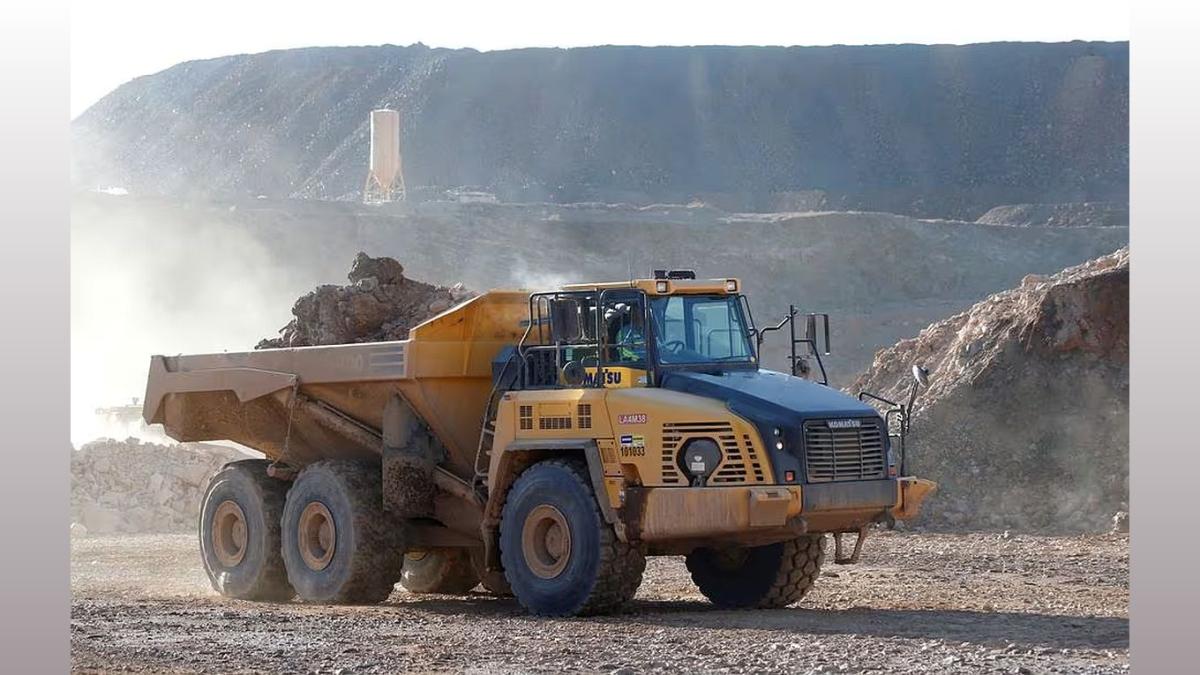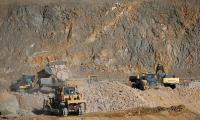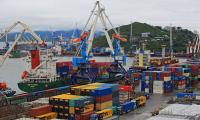India's Renewable Energy Ambitions: Grid, Minerals Key - Survey
India needs to invest in grid infrastructure and critical minerals for successful renewable energy transition, says Economic Survey 2024-25.

Photograph: Steve Marcus/Reuters
New Delhi, Jan 31 (PTI) India must prioritise investment in extensive grid infrastructure improvements and secure sourcing of critical minerals to strengthen its renewable energy initiatives, suggested Economic Survey 2024-25.
The document tabled in Parliament on Friday noted that despite being one of the world's lowest greenhouse gas emitters per capita, India has made notable strides in reducing the emissions intensity of its energy consumption.
This progress is largely due to the increased deployment of renewable energy sources alongside a suite of energy conservation measures, it also noted.
Nonetheless, it stated that the growth of renewable energy faces substantial hurdles, particularly in energy storage technologies and the sourcing of critical minerals necessary for this transition.
While alternative solutions such as green hydrogen present a viable option for the medium term, affordability issues remain a significant barrier to widespread adoption, it pointed out.
Furthermore, it stated that although nuclear energy could contribute to India's energy mix, its expansion is impeded by a lack of a supportive ecosystem and the monopolistic nature of nuclear fuel supply chains.
Lessons learned from the experiences of developed economies underscore the risks of prematurely shutting down thermal energy sources without viable technological alternatives that ensure a stable energy supply, it pointed out.
The challenges in harnessing renewable energy at scale indicate that India will need to continue the efforts to maximise the efficiency of its existing fossil fuel resources in the medium term.
The advancement and deployment of low-emission thermal power technologies, including Advanced Ultra Super Critical (AUSC) power plants, will play a pivotal role in this transition.
This AUSC power plant will reduce emissions by about 11 per cent compared to super-critical plants.
Presently, given the resource endowments, coal cannot be neglected as a reliable and affordable source of energy for India's development, it stated.
Lessons learnt from the experiences of developed economies caution against shutting down thermal energy without adequate technological alternatives that allow a stable energy supply, it pointed out.
India is uniquely positioned in terms of its growing energy requirements.
India must decisively leverage its best resources, advanced technologies, and expertise to accelerate its journey toward becoming a developed nation by 2047 while ensuring a low-carbon pathway.
Following this critical milestone, the nation must pursue its ambitious goal of achieving net zero emissions by 2070, the survey stated.
This will demand innovative strategies and strong implementation plans to confront climate challenges while ensuring sustainable development takes centre stage.
Innovation and investment in addressing the problems related to renewable energy - battery storage, grid infrastructure and critical minerals - must be the focus in the short to medium term.
India's climate efforts are anchored in its ambitious commitment to achieve net zero emissions by 2070.
This long-term goal is entwined with the country's aspirations for high and stable economic growth, which envisions becoming a developed nation by 2047.
Realising this vision necessitates a delicate balance, achieving low-carbon development while ensuring that critical imperatives such as affordable energy security, job creation, sustained economic expansion, and environmental sustainability are met.
To effectively navigate this dual challenge, India is adopting a holistic approach that embeds mitigation and adaptation in the growth strategy, it observed.
Mitigation focuses on addressing the root causes of climate change by reducing greenhouse gas emissions, while adaptation seeks to minimize the adverse impacts of climate change through a robust framework for resilience.
Given the backdrop of decreasing global financial commitments to support climate action in developing countries, India must increasingly prioritise building resilience to safeguard the benefits of its rapid economic growth against climate-induced setbacks, it said.
Investments in research and development related to battery storage technologies, as well as the recycling and sustainable disposal of waste associated with renewable energy systems, are critical factors in ensuring a reliable supply of energy from renewable sources and its sustainability.
The mission mode approach to developing carbon capture, utilization, and storage technology is essential for the continued use and enhancement of thermal power plants in the medium term, the survey said.
Accomplishing the goal of net zero emissions by 2070 will require innovative strategies and robust implementation plans designed to confront both the challenges posed by climate change and the need for sustainable development to take centre stage.
To strengthen its renewable energy initiatives, India must prioritise investment in extensive grid infrastructure improvements and the secure sourcing of critical minerals necessary for this transformative shift.
The survey also said that the off-grid solar systems shall be provided only where electricity supply through grid is not techno-economically feasible.
The document tabled in Parliament on Friday noted that despite being one of the world's lowest greenhouse gas emitters per capita, India has made notable strides in reducing the emissions intensity of its energy consumption.
This progress is largely due to the increased deployment of renewable energy sources alongside a suite of energy conservation measures, it also noted.
Nonetheless, it stated that the growth of renewable energy faces substantial hurdles, particularly in energy storage technologies and the sourcing of critical minerals necessary for this transition.
While alternative solutions such as green hydrogen present a viable option for the medium term, affordability issues remain a significant barrier to widespread adoption, it pointed out.
Furthermore, it stated that although nuclear energy could contribute to India's energy mix, its expansion is impeded by a lack of a supportive ecosystem and the monopolistic nature of nuclear fuel supply chains.
Lessons learned from the experiences of developed economies underscore the risks of prematurely shutting down thermal energy sources without viable technological alternatives that ensure a stable energy supply, it pointed out.
The challenges in harnessing renewable energy at scale indicate that India will need to continue the efforts to maximise the efficiency of its existing fossil fuel resources in the medium term.
The advancement and deployment of low-emission thermal power technologies, including Advanced Ultra Super Critical (AUSC) power plants, will play a pivotal role in this transition.
This AUSC power plant will reduce emissions by about 11 per cent compared to super-critical plants.
Presently, given the resource endowments, coal cannot be neglected as a reliable and affordable source of energy for India's development, it stated.
Lessons learnt from the experiences of developed economies caution against shutting down thermal energy without adequate technological alternatives that allow a stable energy supply, it pointed out.
India is uniquely positioned in terms of its growing energy requirements.
India must decisively leverage its best resources, advanced technologies, and expertise to accelerate its journey toward becoming a developed nation by 2047 while ensuring a low-carbon pathway.
Following this critical milestone, the nation must pursue its ambitious goal of achieving net zero emissions by 2070, the survey stated.
This will demand innovative strategies and strong implementation plans to confront climate challenges while ensuring sustainable development takes centre stage.
Innovation and investment in addressing the problems related to renewable energy - battery storage, grid infrastructure and critical minerals - must be the focus in the short to medium term.
India's climate efforts are anchored in its ambitious commitment to achieve net zero emissions by 2070.
This long-term goal is entwined with the country's aspirations for high and stable economic growth, which envisions becoming a developed nation by 2047.
Realising this vision necessitates a delicate balance, achieving low-carbon development while ensuring that critical imperatives such as affordable energy security, job creation, sustained economic expansion, and environmental sustainability are met.
To effectively navigate this dual challenge, India is adopting a holistic approach that embeds mitigation and adaptation in the growth strategy, it observed.
Mitigation focuses on addressing the root causes of climate change by reducing greenhouse gas emissions, while adaptation seeks to minimize the adverse impacts of climate change through a robust framework for resilience.
Given the backdrop of decreasing global financial commitments to support climate action in developing countries, India must increasingly prioritise building resilience to safeguard the benefits of its rapid economic growth against climate-induced setbacks, it said.
Investments in research and development related to battery storage technologies, as well as the recycling and sustainable disposal of waste associated with renewable energy systems, are critical factors in ensuring a reliable supply of energy from renewable sources and its sustainability.
The mission mode approach to developing carbon capture, utilization, and storage technology is essential for the continued use and enhancement of thermal power plants in the medium term, the survey said.
Accomplishing the goal of net zero emissions by 2070 will require innovative strategies and robust implementation plans designed to confront both the challenges posed by climate change and the need for sustainable development to take centre stage.
To strengthen its renewable energy initiatives, India must prioritise investment in extensive grid infrastructure improvements and the secure sourcing of critical minerals necessary for this transformative shift.
The survey also said that the off-grid solar systems shall be provided only where electricity supply through grid is not techno-economically feasible.
You May Like To Read
TODAY'S MOST TRADED COMPANIES
- Company Name
- Price
- Volume
- Vodafone-Idea
- 11.36 ( -2.49)
- 94664837
- AvanceTechnologies
- 1.16 (+ 4.50)
- 34522155
- Sunshine-Capital
- 0.26 ( -3.70)
- 29015901
- Alstone-Textiles
- 0.27 ( -3.57)
- 28695959
- Mehai-Technology
- 1.65 ( -4.62)
- 28262795






